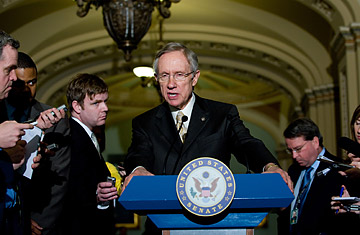
Senate majority leader Harry Reid speaks on pending legislation during a press conference at the Capitol
It's been so long since Senate majority leader Harry Reid has enjoyed the sweet taste of victory that he's decided he's going to try to make a habit out of it. As always in the Senate, that's much easier said than done.
Two weeks ago, when Reid yanked a bipartisan jobs bill that was hammered out by Democrat Max Baucus and Republican Chuck Grassley, it looked like he was on course to do the same thing he did with health care reform: pull a bipartisan deal and replace it with a partisan bill. But that barely worked when the Democrats had 60 votes — so how could Reid hope to ram something through now, when he's one vote short of stopping a Republican filibuster?
The answer is that Reid learned a valuable lesson from health care. Swallowing can be near impossible when you stuff your face, but if you take smaller bites, legislation goes down easier. And so five Republicans so couldn't resist the stripped-down, $15 billion jobs package Reid pushed that they voted to end their own party's filibuster, and 13 Republicans Wednesday votes for passage of the measure, which includes tax incentives for employers who hire and money for highway construction. That gave Reid his first victory since the passage of health care reform on Christmas Eve. Reid's strategy was "perfect," says Senator Claire McCaskill, a Missouri Democrat, who adds that it "smoked out people on the merits of the proposition because we kept it small and simple. And I think the more we can do pieces of legislation that are easily explained and easily understood, the harder it is for [Republicans] to keep playing the game they're playing."
It's a recipe for success that Reid plans on repeating. He has now lined up a series of smaller jobs-related bills. Next up is popular legislation to create a $200 million public-private partnership aimed at increasing tourism in the U.S., which could bring in $4 billion in new revenues and add thousands of jobs. The bill went down in flames last June after Senators from both sides of the aisle sank it with unrelated amendments on the auto bailout and a study on oil prices.
Given last year's experience, it seems likely that Reid will again move to limit amendments. But doing so is a controversial move that angers Republicans, who have used it as Exhibit A of how Democrats in Congress aren't extending the bipartisan olive branch pushed by President Barack Obama. "Standard Harry Reid," says Senator John McCain, an Arizona Republican. "No bipartisanship. Just ram it through. Just pick off a few Republicans. That's been their strategy from the beginning."
Reid's office says that limiting amendments is hardly a new practice and that Republican leaders indulged in it repeatedly when they were in power. In the wake of the jobs bill success, he is dusting off a long list of popular bills, like the tourism legislation, that will be hard for Republicans to vote against, including a package that extends unemployment insurance, health care benefits for the unemployed and tax breaks for companies; a bill to help ease credit for small businesses; the Federal Aviation Administration's reauthorization, a bipartisan measure that has been kicking around Congress for three years and would, analysts say, create upwards of 125,000 new jobs by modernizing aerospace infrastructure; and "meaningful" infrastructure investments, including, possibly, energy programs. "Every time you add something to a bill, there are some people who think that you bring support on — maybe you do, but you probably get support lopping off," says Senator Ben Nelson, a Nebraska Democrat. "And so I've always felt that with certain legislation, you ought to do it incrementally, because you're a lot more likely to get people to be supportive of, let's say, 70% of it. You put it all together in one package, you can't get it done."
The House passed one large $154 billion jobs bill in December, and it remains to be seen what they'll make of Reid's version, which will have to be reconciled or passed in pieces by the House before the President can sign it into law. "It is accurate to say that there would be disagreements," House majority leader Steny Hoyer told reporters on Tuesday. "But we really need to see what the Senate does."
Still, endangered Democratic incumbents don't mind that the strategy keeps the jobs agenda out front in the news each week, especially if Democrats can keep winning votes. And in the meantime, Democratic Senators are riding high on their one — at least on paper — bipartisan victory. "I hope that a few of those Republicans who decided to vote to move the process forward on job creation would do so as well with health care," says Senator Bob Casey, a Pennsylvania Democrat. "Because we have an opportunity to move forward now. Everyone's at the table, and there's no excuse anymore."
